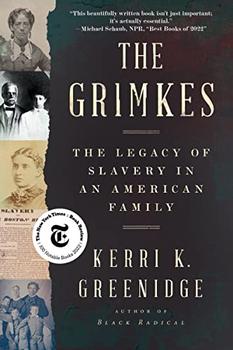Summary | Excerpt | Reviews | Beyond the Book | Readalikes | Genres & Themes | Author Bio

The Legacy of Slavery in an American Family
by Kerri K. Greenidge
In the forty-five years between their appearance in Boston and Nana's near-fatal train crash in Bridgeport, the Grimke brothers earned the praise of social reformers, Black and white, who chronicled their various accomplishments in the press in order to counter popular assumptions about Black intellectual and moral inferiority. The multiple successes of Archie and Frank, both born enslaved in Charleston, offered evidence, as one Black newspaper put it, "of the colored man's worth." Those successes included Frank's pastorship at Fifteenth Street Presbyterian, Archie's Boston law firm, and both brothers' shared residence in the respectable Strivers' Row neighborhood of Washington, DC. 5 The near death of Nana, Archie's only child and Frank's only niece, prompted hundreds of letters of concern from Black scholars, businessmen, clergy, and educators, many of whom greeted Nana's survival as a sign that "God has once again blessed this family by sparing the life of its most promising descendant." 6
Yet, as Nana spent nearly two months at the Bridgeport Hospital before moving to a friend's townhouse in Boston, where Archie dressed her wounds and reset her cast, the same Talented Tenth that celebrated Nana's survival and praised the Grimke brothers' achievements gradually turned to private gossip and public shaming. Ever since Nana had graduated from Boston's Normal School of Gymnastics and joined the faculty at Washington's Armstrong Manual Labor School in 1902, many members of the colored elite whispered that her poetry and short stories, though brilliant, were signs of "an unquiet mind." As a woman older than thirty who never apologized for her decision to shun marriage and child-rearing, Nana's racial respectability was always debated. 7 Her failure at Carleton College and Cushing Academy, two of the best white schools in the country, were rumored to be the result of Nana's insubordination and Archie's mistakes as a single father; her eventual graduation from Boston Girls' Latin was supposedly the result of Archie and Frank's intervention. But the thing that sent a collective chill down the spine of the colored elite was the fact that Nana had been found after the crash in that kimono, with her legs and arms displayed across the Bridgeport rubble. This proved, the gossips concluded, that Nana was "not the figure of colored womanhood that the race needs." Even more damning was the fact that Nana was found in such a compromising position three years after school administrators in Washington, all Black men, accused her of being "unfitted for the work [of teaching] by lack of natural ability as well as training," a charge that Archie fought successfully behind the scenes. He had known the colored school superintendent for years and personally convinced him to transfer Nana to the English department at the city's prestigious M Street High School. Although Nana's teaching at M Street returned her to the good graces of the colored elite, her "scandalous dress" aboard the Boston-bound express train and her refusal to properly ask for forgiveness for it caused many to whisper that she was a "young woman wholly unwilling to understand her place." 8
Even if she had faced accusations of impropriety for years, the reproach that followed her 1911 train crash emerged in the context of Nana's rising profile as a popular poet, short-story writer, and essayist. Unlike the race literature of such contemporaries as Pauline Hopkins and Charles W. Chesnutt—Black writers whose realist fiction dealt explicitly with themes of Southern lynching and slavery's legacies—Nana's poetry was abstract and supposedly unconcerned, as one critic noted, "with the doings of the race." 9 Worse still, when Nana did address themes of lynching, anti-Black racial violence, and the legacies of enslavement, she arraigned God for failing to deliver Black people "from this land of lies." For a Talented Tenth whose survival often depended on a collective amnesia about the reality from which they came—Southern enslavement, Northern communities relentlessly targeted by white violence, and Black mothers raped by white men—Nana's challenge to God and the universe to "hear the dying cries" of Black people victimized by America's racial project was nothing short of blasphemous. "Angelina is Bostonese; she is learned and mad also," wrote a reviewer in the Black newspaper, the Indianapolis Freeman. "You must whisper to Him, Angelina, and He will deliver the race in due time." 10 As Nana recovered from her injuries, such popular criticism of her boldness, of her "disregard for propriety," and of her "tendency to stir up those private things that the race does not wish to remember" became fodder for those members of the Talented Tenth who privately bemoaned that the Grimkes "constantly fly too close to the sun." 11
Reprinted from The Grimkes: The Legacy of Slavery in an American Family by Kerri K. Greenidge. Copyright © 2022 by Kerri K. Greenidge. Used with permission of the publisher, Liveright Publishing Corporation, a division of W. W. Norton & Company, Inc. All rights reserved.




The secret of freedom lies in educating people, whereas the secret of tyranny is in keeping them ignorant
Click Here to find out who said this, as well as discovering other famous literary quotes!
Your guide toexceptional books
BookBrowse seeks out and recommends the best in contemporary fiction and nonfiction—books that not only engage and entertain but also deepen our understanding of ourselves and the world around us.